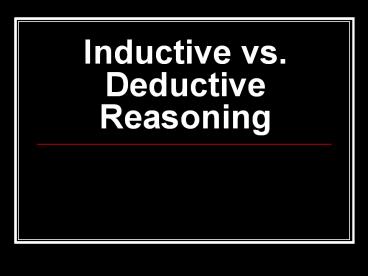Inductive vs. Deductive Reasoning - PowerPoint PPT Presentation
1 / 23
Title:
Inductive vs. Deductive Reasoning
Description:
Inductive vs. Deductive Reasoning Deductive Reasoning Starts with a general rule (a premise) which we know to be true. Then, from that rule, we make a true conclusion ... – PowerPoint PPT presentation
Number of Views:334
Avg rating:3.0/5.0
Title: Inductive vs. Deductive Reasoning
1
Inductive vs. Deductive Reasoning
2
Deductive Reasoning
- Starts with a general rule (a premise) which we
know to be true. Then, from that rule, we make a
true conclusion about something specific.
3
Deductive Reasoning
- The process of reasoning from known facts to
conclusions. When you reason deductively, you can
say therefore with certainty. If your facts
were firm to begin with, then your conclusions
will also be firm.
4
Deductive Reasoning
5
Deductive Reasoning
- From vague
- To specific
6
A deductive argument
- is one in which it is impossible for the premises
to be true but the conclusion false. - It is supposed to be a definitive proof of the
truth of the claim (conclusion). - Premise ? All men are mortal.
- Premise ? Socrates was a man.
- Conclusion ? Socrates was mortal.
- If the premises are true (and they are), then it
simply isn't possible for the conclusion to be
false. - If you have a deductive argument and you accept
the truth of the premises, then you must also
accept the truth of the conclusion.
7
A deductive argument
8
Deductive Reasoning
- Example
- Smith owns only blue pants and brown pants.
Smith is wearing a pair of pants today. So,
Smith is wearing either blue or brown pants today.
9
Inductive Reasoning
- The process of going from observations to
conclusions. - This type of conclusion is sometimes called an
inference.
10
Inductive Reasoning
- Observing that something is true many times, then
concluding that it will be true in all instances - Using the data to make a prediction
11
Inductive Reasoning
12
Inductive Reasoning
- From specific
- To vague
13
An inductive argument
- is one in which the premises are supposed to
support the conclusion. - If the premises are true, it is unlikely that the
conclusion is false. - The conclusion probably follows from the
premises. - Premise ? Socrates was Greek.
- Premise ? Most Greeks eat fish.
- Conclusion ? Socrates ate fish.
- Even if both premises are true, it is still
possible for the conclusion to be false (maybe
Socrates was allergic to fish). - Words which tend to mark an argument as inductive
include probably, likely, possibly and reasonably.
14
A inductive argument
True Premise
True Premise
Probably True Conclusion
15
Inductive Reasoning
- Example
- January has been cold here in Siberia. Today is
January 14, so it is going to be another cold day
in Siberia.
16
Which conclusion below shows evidence of
deductive reasoning?
- One time an employee used store computers to
download a harmful virus, so employee computer
use is a security threat. - Many customers complained about employees using
computers rather than working, so computer misuse
was harming the companys sales. - An employee on a break distracted other employees
by using a computer in a public area for private
business, so that employee was given a warning. - Several employees left customer sales information
visible on computer screens, so those employees
were instructed to always close windows with
personal information.
17
Lets Practice
- The word wall is Inductive
- The windows are Deductive
18
1
- Premise Everything made of copper conducts
electricity. - Premise
- This wire is made of copper.
- Conclusion This wire will conduct electricity.
19
2
- Premise Socrates was Greek.
- Premise Most Greeks eat fish.
- Conclusion Socrates probably ate fish.
20
3
- The local branch of Wachovia Bank was robbed
yesterday. Jenny needed money to pay off her
gambling debts. She just bought a gun two days
ago, and I saw her hanging around the local
Wachovia Bank yesterday morning. Today the
bookies goons stopped looking for Jenny. So
Jenny robbed Wachovia Bank yesterday.
21
4
- Premise All turtles have shells.
- Premise The animal I have captured is a turtle.
- Conclusion I conclude that the animal in my bag
has a shell.
22
5
- Sherlock Holmes and Watson were on a camping
trip. They had gone to bed and were lying there
looking up at the sky. Holmes said, Watson,
look up. What do you see? - I see thousand of stars.
- And what does that mean to you?
- I guess it means we will have another nice day
tomorrow. What does it mean to you, Holmes? - To me, it means someone has stolen our tent.
23
6
- Premise Tonya is seen walking from her car to
her home with a set of golf clubs. - Premise Tonyas husband Jeff loves golf and
tomorrow is his birthday.
- Conclusion Tonya has bought the set of golf
clubs for Jack.































